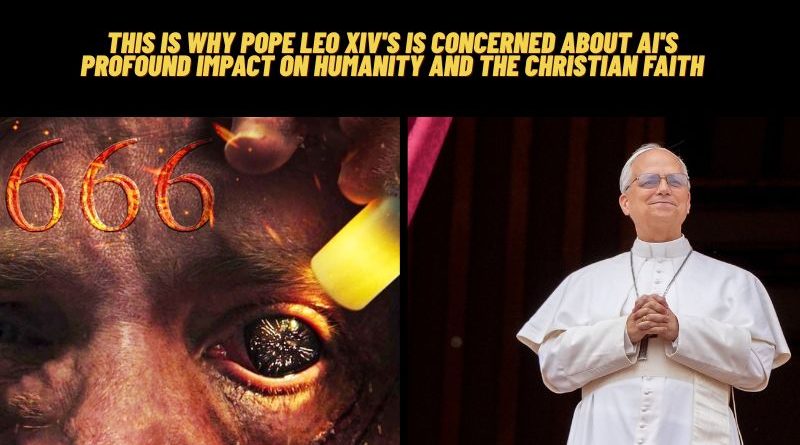THIS IS WHY Pope Leo XIV’s is so Concerned about AI’s Profound Impact on Humanity and the Christian Faith
In May 2025, following the death of Pope Francis, Cardinal Robert Francis Prevost, an American-born Augustinian friar, was elected as the 267th Pope of the Catholic Church. Taking the name Leo XIV, he became the first U.S.-born pontiff, marking a historic shift for the Vatican. From the outset, Pope Leo XIV has positioned artificial intelligence (AI) as one of the defining challenges of our era, drawing parallels to the industrial revolution addressed by his namesake, Pope Leo XIII. In his early addresses and writings, the Pope has voiced deep worries about AI’s potential to undermine human dignity, exacerbate social inequalities, and dilute authentic Christian spirituality. This article explores the roots of his concerns and their implications for both humanity and Christianity.
## The Inspiration Behind the Name: A Modern Echo of “Rerum Novarum”
Pope Leo XIV’s choice of papal name was no coincidence. In his first public explanation, he referenced Pope Leo XIII’s 1891 encyclical *Rerum Novarum* (“Of New Things”), which critiqued the excesses of industrialization and advocated for workers’ rights, fair wages, and human dignity amid rapid technological change. Leo XIV sees AI as today’s “new things”—a technological revolution that, like industrialization, promises progress but risks exploitation and dehumanization.
“I chose to take the name Leo XIV… because Pope Leo XIII in his historic Encyclical Rerum Novarum addressed the social question in the context of the first great industrial revolution,” the Pope stated shortly after his election. He views AI as a “new social question,” requiring the Church to engage boldly with ethical dilemmas. This framing underscores his belief that AI is not merely a tool but a force reshaping society, much like the factories and machines of the 19th century. By invoking this legacy, Leo XIV signals his intent to potentially issue a new encyclical on AI, guiding Catholics and the world toward responsible innovation.
## AI’s Threat to Human Dignity and Society
At the heart of Pope Leo XIV’s worries is AI’s potential erosion of human dignity—a core tenet of Catholic social teaching. In a May 2025 address, he identified AI as “one of the main issues facing humanity,” warning that it poses “challenges to defending human dignity, justice, and labor.” He has highlighted how AI-driven automation could displace jobs, widen economic gaps, and reduce humans to mere data points in algorithmic systems.
The Pope has also expressed alarm over AI’s impact on vulnerable groups, particularly children. In a June 2025 statement, he cautioned that excessive exposure to AI could hinder “intellectual, neurological, and spiritual development,” fostering isolation and diminishing interpersonal connections. “No algorithm can ever replace a hug,” he poignantly remarked, emphasizing that AI lacks the empathy and relational depth essential to human flourishing.
Furthermore, Leo XIV describes humanity as “at a crossroads” due to the digital revolution fueled by AI. He stresses shared responsibility: developers and users must ensure AI promotes the common good, not exploitation. Without ethical safeguards, he warns, AI could amplify inequalities, manipulate information, and undermine free will—echoing broader societal fears about surveillance, bias, and loss of agency.
## Implications for Christianity: Authenticity vs. Algorithmic Faith
Pope Leo XIV’s concerns extend deeply into the realm of faith, where AI threatens to commodify spirituality. He has criticized AI-generated religious content—such as automated prayers, sermons, or images—that proliferates on social media, often lacking “theological depth and lived faith.” In response, the Vatican under his leadership has launched “digital missionaries” to counter this trend, promoting authentic evangelization over viral, superficial trends.
The Pope fears that AI could distort Christian doctrine by generating misleading or heretical materials, eroding the communal and sacramental aspects of faith. For instance, discussions around AI in confessional settings have raised red flags about sacrilege and the incursion of technology into sacred spaces. He advocates for “moral reflection, bold evangelization, and concrete action” to frame AI as a tool for good, rather than a substitute for genuine spiritual encounter.
This stance aligns with Catholic anthropology, which views humans as uniquely created in God’s image, with irreplaceable capacities for love, creativity, and moral discernment. AI, in Leo XIV’s view, risks blurring these lines, prompting questions like: “Who and what is a human being?” in an era of advanced machines.
## A Call for Ethical Guidance and Hope
Despite his worries, Pope Leo XIV’s approach is not alarmist but proactive. He encourages the Church and society to “direct how AI is designed, deployed, and used for good,” positioning Catholics as leaders in ethical AI discourse. His papacy’s early focus on AI has been praised as a model for religious engagement with technology, urging dialogue between faith, science, and policy.
In a world grappling with AI’s rapid evolution, Leo XIV’s voice offers a moral compass, reminding us that technology must serve humanity, not supplant it. As he builds on Leo XIII’s legacy, the Pope invites believers and non-believers alike to confront AI’s challenges with faith, reason, and compassion—ensuring that progress enhances, rather than diminishes, our shared human story.





